
Digital Presence: Optimizing your online presence to attract high-value clients
January 9, 2024
Beyond Transactions: Building long-term relationships with clients
January 23, 2024Navigating BOI Reports for LLCs and Law Firms: A Comprehensive Guide by Prestige Accounting & Consulting.
In the intricate landscape of business regulations, one term gaining significant importance is the Beneficial Ownership Information (BOI) Report. This report plays a crucial role in enhancing transparency and combating financial crimes. Join us as we unravel the mystery surrounding BOI Reports and delve into their significance in the business world.
Understanding BOI Reports:
1. What is a BOI Report?
Understanding Beneficial Ownership Information Reports:
- Decoding the BOI Report: The BOI Report, also known as the Beneficial Ownership Information Report, is a comprehensive document designed to disclose vital details about a company’s ownership structure. It sheds light on the individuals who ultimately benefit from or control the company’s assets.
- Components of a BOI Report: A typical BOI Report includes essential information such as the full legal name of the reporting company, details about beneficial owners, and specific data on ownership interests. It aims to provide a clear snapshot of the company’s ownership landscape.
2. Why is a BOI Report Necessary?
- Enhancing Transparency: BOI Reports contribute to increased transparency in business operations. By divulging ownership information, companies foster trust and accountability in their relationships with stakeholders, investors, and regulatory bodies.
- Combatting Financial Crimes: The information gathered in a BOI Report serves as a powerful tool in the fight against financial crimes, such as money laundering and fraud. It enables authorities to trace and identify individuals behind complex ownership structures.
3. Who Must File a BOI Report?
- Mandatory Filings: Certain business entities, especially those engaged in international activities, are obligated to file a BOI Report. The criteria for mandatory filings may vary based on factors such as the type of business activity, investment thresholds, and government approvals.
- Consulting with Experts: Navigating the regulatory landscape can be challenging. Consulting with experts, like those at Prestige Accounting & Consulting, ensures that your business not only meets mandatory reporting requirements but also optimizes the benefits associated with BOI Reports.
4. Who Is Exempt from BOI Reporting?
- Sole Proprietorships and General Partnerships: Businesses structured as sole proprietorships and general partnerships are generally exempt from BOI reporting, as they are not registered legal entities.
- Exemption Criteria: FinCEN’s reporting rule outlines 23 types of companies that may qualify for exemption from filing a BOI report.
- Securities Reporting Issuer: Exempt if registered under section 12 of the Securities Exchange Act of 1934 or required to file supplementary information under section 15(d) of the same act.
- Governmental Authority: Exempt if established under U.S. laws, an Indian tribe, a State, or a political subdivision, exercising governmental authority.
- Bank: Exempt if defined as a “bank” under the Federal Deposit Insurance Act or Investment Company Act of 1940.
- Credit Union: Exempt if a “Federal credit union” or “State credit union” under the Federal Credit Union Act.
- Depository Institution Holding Company: Exempt if a “bank holding company” or “savings and loan holding company” under relevant acts.
- Money Services Business: Exempt if a registered money transmitting or services business with FinCEN.
- Broker or Dealer in Securities: Exempt if a registered “broker” or “dealer” under the Securities Exchange Act of 1934.
- Securities Exchange or Clearing Agency: Exempt if an “exchange” or “clearing agency” registered under the Securities Exchange Act of 1934.
- Other Exchange Act Registered Entity: Exempt if registered with the Securities and Exchange Commission but not falling under specific categories.
- Investment Company or Investment Adviser: Exempt if an “investment company” or “investment adviser” registered with the SEC.
- Venture Capital Fund Adviser: Exempt if an investment adviser described in section 203(l) of the Investment Advisers Act of 1940.
- Insurance Company: Exempt if defined as an “insurance company” under the Investment Company Act of 1940.
- State-Licensed Insurance Producer: Exempt if an authorized insurance producer with a physical presence in the U.S.
- Commodity Exchange Act Registered Entity: Exempt if a registered entity under the Commodity Exchange Act.
- Accounting Firm: Exempt if a public accounting firm registered under the Sarbanes-Oxley Act of 2002.
- Public Utility: Exempt if a regulated public utility providing specified services within the U.S.
- Financial Market Utility: Exempt if designated by the Financial Stability Oversight Council.
- Pooled Investment Vehicle: Exempt if operated or advised by specific entities and meeting relevant criteria.
- Tax-Exempt Entity: Exempt if meeting specific criteria related to tax-exempt status.
- Entity Assisting a Tax-Exempt Entity: Exempt if providing financial assistance to a tax-exempt entity and meeting defined criteria.
- Large Operating Company: Exempt if meeting criteria related to employees, presence, tax filings, and gross receipts.
- Subsidiary of Certain Exempt Entities: Exempt if wholly owned or controlled by specified exempt entities.
- Inactive Entity: Exempt if meeting criteria related to existence, inactivity, ownership, funds, and assets.
If an LLC or Corporation falls into one of these categories and meets the specified criteria, it is not obligated to submit a BOI report.
Reporting Deadlines.
FinCen started to accept reports on January 1, 2024. Prior to this date, reports weren’t allowed. The report deadline is based on the date that the company was created or registered.
- For companies established or registered for business activities prior to January 1, 2024, the initial BOI report must be submitted by January 1, 2025.
- If the company was created or registered between January 1, 2024, and January 1, 2025, the initial BOI report is required within 90 days of the entity’s formation.
- For those companies formed or registered on or after January 1, 2025, the initial BOI report is due within 30 days of the entity’s formation.
The penalties for failing to report beneficial ownership information by the deadline can vary and may include:
- Monetary Penalties: Entities that do not comply with reporting requirements may face financial penalties. The specific amount can vary based on the severity of the violation and may be determined by regulatory authorities.
- Legal Consequences: Non-compliance with beneficial ownership reporting obligations may result in legal action against the entity. This could involve court proceedings, fines, or other legal consequences.
- Loss of Benefits: Failure to adhere to reporting deadlines may lead to the loss of certain benefits or privileges that compliant entities might enjoy. This could include missing out on incentives, exemptions, or other advantages provided to entities fulfilling reporting requirements.
- Reputational Damage: Non-compliance can harm the reputation of the reporting entity. Negative publicity and a damaged business reputation may result from failure to meet regulatory obligations.
- Suspension or Revocation of Business Authorization: Regulatory authorities may have the power to suspend or revoke the authorization of a business that consistently fails to meet reporting deadlines, preventing it from conducting certain activities.
- Increased Scrutiny: Entities that do not comply with reporting requirements may face increased scrutiny from regulatory bodies, potentially leading to more extensive investigations and audits.
It’s crucial for businesses to understand and meet the deadlines for beneficial ownership reporting to avoid these potential penalties and consequences. Seeking professional assistance and staying informed about regulatory requirements can help ensure timely compliance.
What information is required for a BOI Report?
Reporting Company Information.
- Full legal name
- Any DBAs, fictitious names, or trade names used to conduct business
- Principal U.S. business address
- Formation jurisdiction (state, tribal, or foreign) of a domestic entity or a foreign entity’s first registered jurisdiction in the U.S.
- IRS taxpayer ID number (TIN), including an EIN. (If a foreign reporting company doesn’t have a TIN from the IRS, it may use a tax ID issued by a foreign jurisdiction and must provide the name of that jurisdiction.
Beneficial Owner Information.
A beneficial owner is someone who possesses or commands a minimum of 25% of the ownership interests in the reporting company or has significant control over the company, whether directly or indirectly.
- Full legal name
- Date of birth
- Complete residential street address
- Personal identification number and issuing jurisdiction from a non-expired U.S. passport; state driver’s license; or other ID document issued by a state, local government, or tribe
- Image of ID Document.
Company Applicant Information.
A company applicant refers to an individual who personally submits the formation or registration document of a reporting company with a U.S. state or Indian tribe.
- Full legal name
- Date of birth
- Complete residential street address
- Personal identification number and issuing jurisdiction from a non-expired U.S. passport; state driver’s license; or other ID document issued by a state, local government, or tribe. They must also provide an image of their ID document.
A beneficial owner or company applicant secure a FinCEN identifier, the reporting company has the option to incorporate this identifier in its report, substituting the need to provide other details about the entity or individual. A FinCEN identifier is a distinct identification number issued upon request to individuals or reporting companies. Individuals can apply for one through an electronic application, while reporting companies can obtain it by indicating their request on the BOI report. It’s important to note that obtaining a FinCEN identifier is not obligatory for anyone.
What Qualifies as Ownership Interest for BOI?
Ownership interest in a reporting company is defined by an individual’s ownership or control of 25% or more of the company’s interests.
Ownership interest encompasses various forms, including:
1. Equity
2. Stock
3. Voting rights
4. Capital or profit interest
5. Any instrument convertible into equity, stock, voting rights, or capital or profit interest
6. Options or other non-binding privileges to buy or sell any of the aforementioned interests
7. Any other instrument, contract, or mechanism establishing ownership
How FinCEN Utilizes BOI Report Data
All data collected through BOI reports by FinCEN will be stored securely in a dedicated database. This information will not be accessible to the public. Authorized government officials at the federal, state, local, tribal, and foreign levels may submit requests to acquire beneficial ownership information for activities sanctioned under national security, intelligence, and law enforcement. Financial institutions can gain access to beneficial ownership information under specific circumstances if the reporting company provides consent.
Where do I find the report form?
You can locate the reporting form by visiting FinCEN’s BOI E-Filing website at https://boiefiling.fincen.gov and choosing the option “File BOIR.”
How do I submit my report?
If your company needs to submit its beneficial ownership information to FinCEN, the process must be completed electronically using the secure filing system accessible through FinCEN’s BOI E-Filing website at https://boiefiling.fincen.gov.
Conclusion
In the pursuit of financial transparency and adherence to regulatory standards, businesses can confidently navigate the BOI reporting landscape with the insights provided in this guide. Let Prestige Accounting & Consulting be your guide, ensuring that your journey through BOI reporting is not only compliant but also optimized for success in the global business sphere. Stay tuned for more insights into the financial intricacies that matter, brought to you by Prestige!





1 Comment
Your commitment to quality really stands out. ❤️